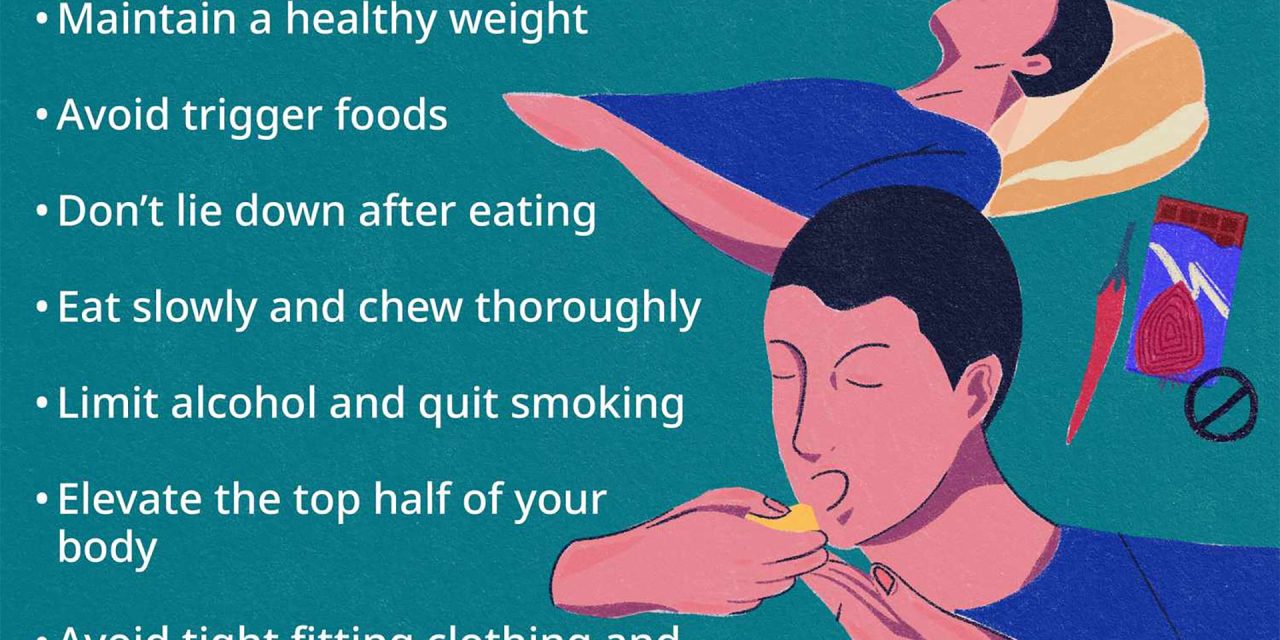To comprehend why acid reflux occurs, it’s essential to understand the body’s anatomy and physiological processes involved in digestion. The lower esophageal sphincter (LES) is a ring of muscle at the bottom of the esophagus that acts like a valve, opening to allow food and liquids to flow into the stomach and closing to prevent stomach contents from flowing back up. Acid reflux happens when the LES is weak or relaxes inappropriately, allowing the stomach’s acidic contents to escape into the esophagus.
Causes and Contributing Factors
Several factors can contribute to the frequency and severity of acid reflux episodes, especially in relation to eating:
- Dietary Triggers: Certain foods and beverages are known to trigger acid reflux. These include spicy foods, fatty or fried items, chocolate, caffeine, alcohol, and acidic foods like tomatoes and citrus fruits. Eating these foods can cause or worsen reflux symptoms.
- Overeating: Consuming large meals can increase pressure on the LES, making it more likely to relax and allow stomach acid to escape. Overeating also means the stomach has to produce more acid to digest the food, increasing the risk of reflux.
- Eating Before Bedtime: Lying down too soon after eating can exacerbate acid reflux symptoms. Gravity helps keep the stomach’s contents in place when you’re upright, but when you lie down, it’s easier for the acid to move up into the esophagus.
- Obesity: Excess body weight can put additional pressure on the abdomen and the LES, increasing the risk of acid reflux. Fat around the belly, in particular, can press against the stomach, forcing contents back up into the esophagus.
- Smoking: Nicotine from cigarettes can weaken the LES, making it easier for stomach acid to escape into the esophagus. Smoking also reduces saliva production, which helps neutralize acid in the esophagus.
- Medications: Certain medications, including some anti-inflammatories, blood pressure drugs, and muscle relaxants, can relax the LES and increase the risk of reflux.
Managing Acid Reflux
If you’re experiencing acid reflux every time you eat, there are several strategies you can adopt to manage your symptoms:
- Modify Your Diet: Identify and avoid foods that trigger your reflux symptoms. Keeping a food diary can help you pinpoint which foods to eliminate or reduce in your diet.
- Eat Smaller, More Frequent Meals: Instead of three large meals, try eating smaller, more frequent meals throughout the day. This can help prevent excessive pressure on your stomach and LES.
- Avoid Eating Before Bedtime: Try to finish eating at least two to three hours before lying down or going to bed to give your stomach time to digest the food.
- Lose Weight: If you’re overweight, losing even a small amount of weight can significantly reduce the pressure on your stomach and LES, decreasing the likelihood of acid reflux.
- Quit Smoking: Giving up smoking can improve your reflux symptoms and overall health.
- Elevate the Head of Your Bed: If you experience reflux at night, elevating the head of your bed by six to eight inches can help prevent stomach acid from flowing back into the esophagus while you sleep.
- Medications: Over-the-counter antacids can provide quick relief by neutralizing stomach acid. If your symptoms are more severe or persistent, your doctor may prescribe stronger medications, such as H2 blockers or proton pump inhibitors, to reduce or block acid production in the stomach.
Acid reflux is a complex condition influenced by dietary habits, lifestyle choices, and physiological factors. If you find yourself suffering from acid reflux every time you eat, it’s crucial to identify and address the underlying causes and contributing factors. By making dietary changes, adjusting your eating and sleeping habits, and seeking medical advice when necessary, you can manage your symptoms and improve your quality of life. Remember, persistent acid reflux should not be ignored, as it can lead to more serious health issues, including esophageal damage and Barrett’s esophagus. Consulting with a healthcare professional can provide you with personalized advice and treatment options tailored to your specific needs.





